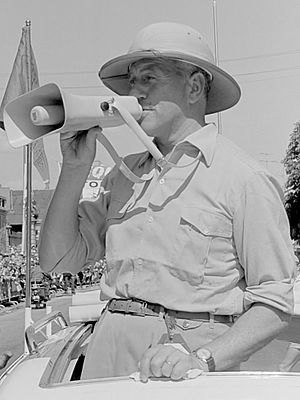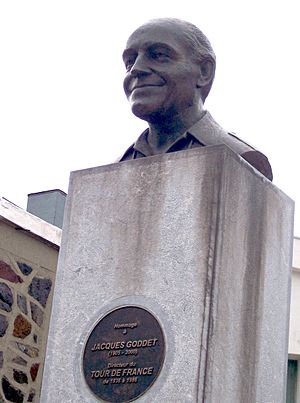Jacques Goddet facts for kids
Quick facts for kids
Jacques Goddet
|
|
|---|---|

Jacques Goddet in 1962
|
|
| Born | 21 June 1905 |
| Died | 15 December 2000 (aged 95) Paris, France
|
| Nationality | French |
| Occupation | Sports journalist |
| Title | Director of the Tour de France |
| Term | 1935 – 1986 |
| Predecessor | Henri Desgrange |
| Successor | Félix Lévitan |
Jacques Goddet (born in Paris, France, on June 21, 1905 – died in Paris, France, on December 15, 2000) was a French sports journalist. He was famous for being the director of the Tour de France bicycle race from 1936 to 1986.
His father, Victor Goddet, helped start L'Auto, the newspaper that began the first Tour de France in 1903. Jacques Goddet became the editor-in-chief of L'Auto in 1931. He even covered the 1932 Summer Olympics in Los Angeles.
Early Career and the Tour de France
Jacques Goddet started working for his father's newspaper in 1924. Four years later, he followed his first Tour de France race. He was amazed watching riders struggle for many hours on difficult mountain paths. Goddet followed almost every Tour de France until 1989. The only times he missed it were in 1932 (when he went to the Los Angeles Olympics) and in 1981 (when he was too sick).
He became the main reporter at L'Auto. In 1936, he took over organizing the Tour de France. This happened when the previous director, Henri Desgrange, became too ill to continue.
Goddet also had ideas for association football. He is known for suggesting the Intercontinental Cup, a big football competition. In the 1970s, he wanted this cup to include club champions from Asia, Africa, and North-Central America. This was in addition to teams from Europe and South America. This idea was similar to what later became the Club World Cup.
L'Auto During Wartime
During the German occupation of France after 1940, the Tour de France was stopped. Jacques Goddet's role during this time was complicated. He encouraged the newspaper's printers to create materials for the Resistance. However, he also supported Philippe Pétain, who led France after the Armistice. Goddet also handed over the keys to the Vélodrome d'Hiver when the Germans wanted to hold thousands of Jewish people there. This event was barely mentioned in Goddet's autobiography, L'Équipée Belle.
Experts Jean-Luc Boeuf and Yves Léonard studied Goddet's writings from that time. They noted that his articles showed strong support for Pétain. For example, in L'Auto on November 4, 1940, he wrote: "In 1940, France is starting another life. The Marshal is going to give us a purifying bath." He also praised Pétain's ideas about "fatherland, work, family" as the motto for France's future. These words were different from France's usual motto of "liberty, equality, fraternity." This showed support for Pétain's new French State, which replaced the republic.
Goddet later said that history should not confuse Pétain with the Vichy government. He believed Pétain had patriotic intentions. Goddet also insisted in his book that he tried to stop the Germans. For example, he refused to organize the Tour de France, even though the Germans offered special benefits.
However, his older brother, Maurice, caused some confusion. Maurice had inherited a share in the family's publishing business. He sold shares to a group of Germans connected to the Nazi party. The main ownership of L'Auto also went to the Germans. This meant L'Auto came under some German control. The general news section, which Goddet had added, became a tool for German propaganda.
When France was freed on August 17, 1944, L'Auto's doors were closed. This was because it had "submitted to German control."
Starting L'Équipe
After the war, Goddet successfully launched a new newspaper called L'Équipe in 1946. However, the government made a rule that Goddet's name could not be linked to the paper. He also could not be seen in its building. This was because other publishers complained that Goddet's name was connected to the old L'Auto and the Tour de France. They felt this gave L'Équipe an unfair advantage.
On L'Équipe's first front page, Goddet wrote without using his name:
We are living through a difficult time. If we don't fight it, selfishness will become too strong. We will fight this by working together. Équipe (team) – this word inspires our group. It helped us during a time of anger and hope when we worked together for the Resistance.
Goddet went to a private school near Oxford, England. He loved Britain and the focus on sports at his school. He wrote in a grand, literary style, like Henri Desgrange. He would call finish lines "magnificent arrivals." He once wrote about French rider Louison Bobet "gallantly accepting the delay given to him by the heavenly handicapper." In hot weather, he wore khaki shorts, a shirt, knee-length socks, and a pith helmet.
L'Équipe's finances were often not good. In May 1965, Goddet agreed to join with a company run by publisher Émilien Amaury. Goddet and Amaury had worked together to successfully restart the Tour de France. Amaury's condition was that his own cycling reporter, Félix Lévitan, would share the organization of the Tour. Lévitan slowly took over more responsibilities from Goddet, especially with sponsorships and money matters.
Goddet and Lévitan were business partners, not close friends. Lévitan became more important when Émilien Amaury bought L'Équipe and the Tour. He was a favorite of Émilien Amaury.
When Émilien Amaury died, his son, Philippe Amaury, took over the company. Philippe wanted to change some things. Lévitan lost favor with Philippe. On March 17, 1987, Lévitan found his office locks changed. A court official was waiting to search it because of claims of financial problems, which were never proven. Goddet became a race director-at-large before leaving the next year.
Jacques Goddet died at 95 years old. His funeral was held in Les Invalides. French President Jacques Chirac called him "one of the inventors of French sport." The prime minister, Lionel Jospin, said: "France and journalism have just lost an exceptional man. He made the Tour de France, through his 50 years at its helm, the most popular French sports event and the one most known across the world." Former winner Laurent Fignon said: "I only knew him a little. But what I remember of him is his personality. He had true moral values and, even if sometimes he could appear hard, he was always fair in his judgments."
See also
 In Spanish: Jacques Goddet para niños
In Spanish: Jacques Goddet para niños


